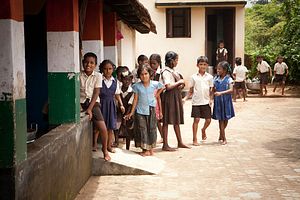A new report, titled Caught Short, found that around 48 million children under the age of five in India suffer from stunted growth — two out of every five Indian children. India had by far the world’s highest number; Nigeria and Pakistan were ranked second and third with 10.3 and 9.8 million children suffering from stunted growth, respectively.
The report was commissioned by the international development charity WaterAid.
Stunting, or chronic malnutrition, is a type of growth failure that occurs in the first two years of a child’s life and is largely irreversible. The problem, linked to a lack of access to toilets and clean water, affects a child’s physical, mental, and emotional development. Unlike acute malnutrition, chronic malnutrition happens over a period of time.
According to the report, 159 million children under the age of 5 in the world are stunted — one in four children in this age group.
Stunting begins before birth, driven by poor nutrition, poor feeding practices, poor food quality, poor sanitation, and contaminated drinking water. A child suffering from stunted growth tends to appear normally proportioned but is actually shorter than normal for his/her age.
A quarter of all stunting cases are estimated to be directly caused by chronic diarrhea in the first two years of a child’s life. “A lack of access to a toilet, clean water, and good hygiene practices also play a major role, as repeated bouts of diarrhea — often caused by dirty water and unhygienic environments — are directly linked to malnutrition,” the report wrote.
The report also mentioned that open defecation — a major problem in India — has a strong correlation with child stunting. As many as 564 million people in India practice open defecation and many are exposed to diseases carried by fecal particles.
“India has the highest concentration in the world of people practicing open defecation. Research shows that high rates of open defecation have a strong correlation with increased rates of stunting, as feces in the environment contaminate hands and surroundings, and spread disease and infection,” the report stated.
“Water, sanitation and hygiene are important determinants of nutrition. With open defecation rampant in India, frequent diarrhea hinders the ability of children to absorb nutrients. India has made significant efforts to improve the nutritional status of children and women, but the beneficial impact of these efforts are threatened by poor WASH [water, sanitation and hygiene],” said Arundati Muralidharan, WaterAid India’s Policy Manager.
According to World Bank figures, India loses 6.4 percent of its GDP – $53.8 billion- due to its sanitation crisis. At least 76 million people in India do not have access to safe drinking water and 774 million people live without adequate sanitation facilities. Around 140,000 India children die annually due to diarrhea, according to WaterAid.
However WaterAid noted that India has made considerable progress in the last few years in reducing child stunting. In 2006, there were at least 48 percent of Indian children had stunted growth, but the number dropped to 39 percent in 2014. Prime Minister Narendra Modi has vowed that his government will provide clean drinking water and proper sanitation for all citizens.
Roshni Kapur is a graduate student at the University of Sydney majoring in Peace and Conflict Studies.

































